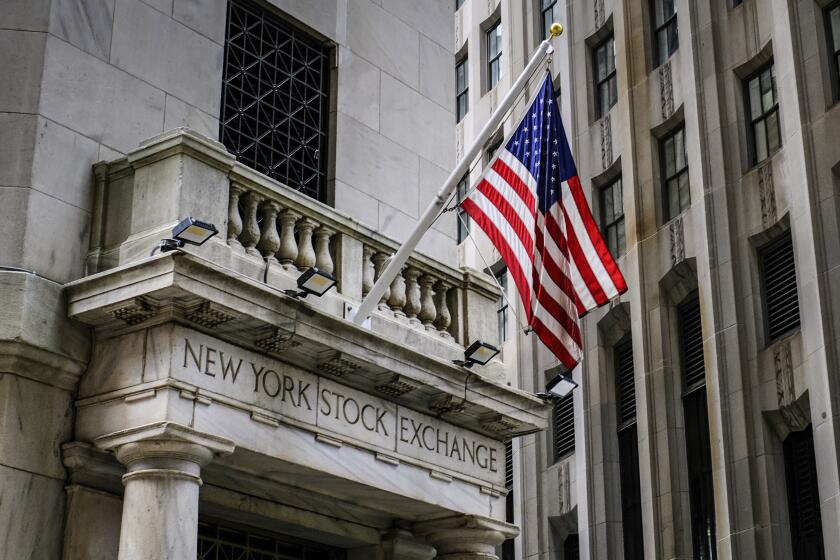Column: China’s faltering economy is a result of state-directed planning. Now comes the global fallout

- Share via
“China is going to eat our lunch? Come on, man,” scoffed then-presidential candidate Joe Biden in 2019. Two years later, Biden declared “The Chinese are eating our lunch. They’re eating our lunch, economically. They’re investing hundreds of billions of dollars in research and development. … We got to compete.”
Mario Cuomo famously said politicians “campaign in poetry, but govern in prose.” But in this case, the poet was closer to the mark. The Chinese economic rocket looks to be running out of fuel.
Chinese economic statistics have never been entirely reliable, but the last reported number for urban youth unemployment we have is 21.3% (it may actually be closer to 50%). One sign it will get worse: China recently announced it will no longer be publishing youth unemployment or consumer confidence numbers.
A sharp drop for Wall Street capped a day of declines worldwide after discouraging data on China raised worries about the global economy.
China is also facing a ripening debt crisis and potential deflationary spiral. For decades, the Chinese government has encouraged real estate speculation and over-investment. As a result, millions of Chinese small investors and families put their eggs in the housing basket, fueling massive bubbles, soaring home prices and crushing increases in debt. Countless skyscrapers, airports, highways, even whole cities, are little more than white elephants thanks to state-directed over-building.
Now, the housing sector — roughly a quarter of China’s economy — is cratering. Falling prices, construction industry bankruptcies and slower growth generally, are scaring consumers out of spending and raising concerns about deflation.
Foreign investment in China is drying up as investors see more contraction on the horizon and foreign firms — and even Chinese ones — move their supply chains elsewhere.
President Xi Jinping’s authoritarian response to all of these and other economic challenges is to insist that everyone should toughen up in the name of national “rejuvenation.” Young people need to “abandon arrogance and pampering” and embrace the Maoist spirit of self-sacrifice, which is why the state cracked down on decadent video-game playing. “Eat bitterness” he tells college grads while banning private test-tutoring, throwing many educated young people out of work in the name of social equality.
China’s government is relaxing restrictions on night markets and street vendors to stimulate spending and create jobs, especially for young people.
Xi believes China is rich enough to do what it needs to do — supplant the United States as the global leader and become a hegemon in, for starters, its own neighborhood. Politically enforced internal discipline, military expansion and consolidation of political and economic power in his hands, is more important than additional economic growth. And by implementing such measures, he all but assures that the economy will get worse. Markets need reliable information and freedom to function, but information is joining economic freedom in lock-up.
In the 1990s, the “neoliberal” consensus was that economic liberalization would push China toward political liberalization. Today, that consensus is out of favor just about everywhere. But it’s increasingly clear that Xi agrees with that view — he just thinks political liberalization is bad. Which is why he’s so willing to tolerate economic contraction to stave off liberalization in any other sphere.
It’s no coincidence that Biden claimed China was eating our lunch when he wanted to get his “American Jobs Plan” approved. In America, the argument for state-directed economic planning is always made in the language of “competitiveness.”
China’s exports tumbled by double digits in July, adding to pressure on the ruling Communist Party to reverse an economic slump.
According to the simplistic binary logic of “competitiveness” China’s economic woes should be good news for America. This zero-sum view sees gains in gross domestic product as points on a scoreboard, where our “wins” are their “losses.” But it doesn’t work that way. Contrary to a lot of bipartisan talking points, China getting richer didn’t make America poorer. And if China’s economy implodes, our economy will suffer as a result.
Policymakers have been struggling to define the Chinese challenge. Is it merely a competitor or a strategic adversary? The Biden administration has been clear that it would prefer to keep China an economic competitor and not a strategic or military adversary. And it has taken a number of praiseworthy steps to prevent the latter.
But it’s important to get the causation right. The Chinese threat is geopolitically and ideologically driven, not economically. Constraining China’s access to sensitive technology and buttressing alliances in the region is necessary not because of China’s money, but because of what the Chinese regime wants to buy with it. A rich, democratic China would be good for everyone, especially China.
More to Read
A cure for the common opinion
Get thought-provoking perspectives with our weekly newsletter.
You may occasionally receive promotional content from the Los Angeles Times.














